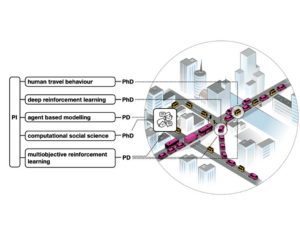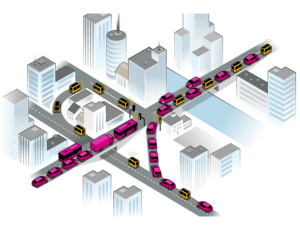Pursuant to §7 (1) and (3) of Resolution No. 61/X/2022 of the Senate of the Jagiellonian University of 26 October 2022 on the rules of recruitment to the Doctoral School of Exact and Natural Sciences at the Jagiellonian University in the academic year 2023/2024, the Director of the Doctoral School of Exact and Natural Sciences announces a competition for three doctoral students with a stipend funded by a research project for the PhD study programme Technical Computer Science.
The project manager, Rafał Kucharski, PhD offers an opportunity to complete the doctorates within the ERC Starting Grant project entitled “COeXISTENCE „Playing urban mobility game with intelligent machines. Simulation framework to discover and mitigate human-machine conflicts before they emerge”.
Description of the research project:
COeXISTENCE is an interdisciplinary research project intersecting between complex social systems, like urban system and their mobility, and machine learning. Project is financed with the prestigious ERC Starting Grant scheme, which funds pioneering, high-risk high-gain challenging research projects. The research is conducted in one of the leading ML groups in Central Europe (GMUM) at the Faculty of Mathematics and Computer Science at Jagiellonian University. The position offers a stable and competitive working conditions (full time employment contract with the salary of ca. 2680€/month – 12 550 PLN)
In COeXISTENCE, with the team of 5, we try to foresee what happens when our cities are shared with autonomous, intelligent robots - competing with us for limited resources. We create virtual environments where individual agents compete to arrive faster, more reliably and cheaper at their destinations. Human agents are simulated with detailed behavioural models, estimated and calibrated on the field data to reproduce how we behave and adapt in the cities. In the same environment the deep learning agents try the same - they use deep reinforcement learning to maximise their rewards. This creates a harsh competition in which machines have upper-hands strong enough to beat us.
In our research group (led by leading experts in Machine Learning and Urban Mobility) we are looking for outstanding and highly motivated candidates with potential to excel in research in in one of the three research profiles.
We offer PhD positions in the three following research profiles:
- PhD 1 with a background in deep reinforcement learning, ideally holding a master’s degree in computer science with experience in developing state-of-the-art RL/ML models. She/he will focus on implementing RL frameworks into the agent-based models of urban mobility, will work closely with a PostDoc of similar experience forming a core of machine-learning component of the project.
- PhD 2 with a background in modelling urban mobility, ideally holding a master’s degree in transportation engineering. She/he will focus on reproducing urban mobility in agent-based models of urban mobility. The main tasks will be to create virtual environments accurately reproducing future of urban mobility and to actively search for conflicts in the urban mobility games.
- PhD 3 with a background in computational social sciences, experienced with analysis of social systems. She/he shall have a strong experience in complex systems to cover the complexity of the mixed environment of humans and machines. She/he will introduce the behavioural component into the project, with ethical dilemmas, the trade-off between transparency and efficiency and multi-objective data-driven optimization of social systems.
We offer:
- active support in reaching scientific excellence,
- meaningful and rewarding research program,
- hands-on experience in the highly demanded IT and ML skills,
- active participation in international scientific community (staff exchanges, conferences, cooperations),
- competitive salary (ca 2680€ , i.e. 12 500 PLN/month –plus bonuses).
- bonuses, e.g. holiday allowance, yearly bonus, and optionally: sport (Benefit Multisport), private health care (PZU).
- Full-time contract for 48 months,
For further inquiries, please contact Dr Rafal Kucharski at coexistence@uj.edu.pl or visit the projects’ website: https://rafalkucharskipk.github.io/COeXISTENCE/
Extra press info:
Candidate’s profile:
- certified good knowledge of English (B2 level at least),
- curiosity and capability to read professional scientific literature,
- master’s degree (expected graduation before October 2023) in one of the following: transportation, computer science, mathematics, physics, econometrics or similar,
- experiences and research interests fitting one of the proposed research profiles,
- good coding skills (Python),
- experiences in one of the following will be a plus: data analysis and or statistical analysis (pandas, R, scipy), multi-agent simulations of complex systems (e.g. AnyLogic, MATSim, NetLOGO), traffic and/or transport modelling (e.g. Visum, Aimsun, SUMO) or machine learning (e.g. tensorflow, pytorch, gymnasium, pettingzoo),
- interests in the sustainable development and future of urban mobility will be helpful in this project,
- team-working and excellent interpersonal skills.
The competition will be conducted by the Selection Committee and the results will be the basis for the admission of the selected candidate(s).
Competition schedule
The first round:
- Announcement of the competition on the Doctoral School website: 03.04.2023
- Opening of the competition (start accepting applications in the IRK): 17.04.2023
- Deadline for submitting applications (closing date for IRK applications): 07.05.2023
- Verification and checking of candidates' documents: 08-12.05.2023
- Entrance examinations: 15-19.05.2023
- Committee meeting: 19.05.2023
- Announcement of results in IRK: 23.05.2023
- Entries: 24-26.05.2023
- Entries (reserve list): 13-27.09.2023
- Expected start date of training: 01.10.2023
The second round:
(announced only in the event of recruitment failure in the first round):
- Opening of the competition (start accepting applications in the IRK): 29.05.2023
- Deadline for submitting applications (closing date for IRK applications): 05.06.2023
- Verification and checking of candidates' documents: 06-09.06.2023
- Entrance examinations: 12-13.06.2023
- Committee meeting: 13.06.2023
- Announcement of results in IRK: 15.06.2023
- Entries: 16-20.06.2023
- Entries (reserve list): 13-27.09.2023
- Expected start date of training: 01.10.2023
The third round:
(announced only in the event of recruitment failure in the second round):
- Opening of the competition (start accepting applications in the IRK): 19.06.2023
- Deadline for submitting applications (closing date for IRK applications): 30.06.2023
- Verification and checking of candidates' documents: 03-05.07.2023
- Entrance examinations: 06-07.07.2023
- Committee meeting: 07.07.2023
- Announcement of results in IRK: 11.07.2023
- Entries: 12-14.07.2023
- Entries (reserve list): 13-27.09.2023
- Expected start date of training: 01.10.2023
The fourth round:
- Opening of the competition (start accepting applications in the IRK): 14.08.2023
- Deadline for submitting applications (closing date for IRK applications): 08.09.2023
- Verification and checking of candidates' documents: 11-12.09.2023
- Entrance examinations: 13-14.09.2023
- Committee meeting: 14-15.09.2023
- Announcement of results in IRK: 19.09.2023
- Entries: 20-22.09.2023
- Entries (reserve list): 25-27.09.2023
- Expected start date of training: 01.10.2023
Candidates need to be recommended by at least one researcher (from any academic institution), recommendation letters need to be uploaded to the IRK system. We encourage to send the documents to the projects e-mail (
coexistence@uj.edu.pl) for pre-screening and potential recommendation.
The recruitment process will be in three consecutive rounds. In each of rounds we will be looking for candidates in all of three profiles. Consecutive rounds will be opened only subject to available places left and may not be opened if all the positions are filled.
The salary will be around 2680€ gross/month (ca 12 550 PLN depending on variable exchange rate) plus yearly bonus and extras (sports, medical cover, holiday budget, etc.).
According to the national regulations, you will not be entitled to the doctoral scholarship, since you will be hired full time on the 48-month contract. The condition of employment is fulfilling all the regulations needed to be hired as research assistant (available upon request at
coexistence@uj.edu.pl) and being enrolled to the doctoral school. The condition of starting the programme is being hired as research assistant (in the external procedure opened for enrolled candidates).
Expected starting date: 1 October 2023.
Additional requirements/ documents due to the specifics of the research project:
- Research plan and motivation (max 2 A4 pages) shall clearly indicate to which of the three research profiles the candidate applies and demonstrate her/his fitness, experiences, and vision for this position
- English certificate (at least B2 level)
Please upload your application documents in the electronic IRK system (irk.uj.edu.pl)
In the case of exposure to factors that are harmful, strenuous, or hazardous to health, the candidate is referred to a medical examination by an occupational physician at the time of enrolment. The candidate is required to provide a medical certificate stating that there are no contraindications to undertaking the training within the deadline set by the programme manager (applies to selected training programmes only).
Higher education certificates obtained abroad should:
- bear an Apostille when the country issuing the document is covered by the Convention Abolishing the Requirement of Legalisation for Foreign Public Documents, done at The Hague on 5 October 1961 (Journal of Laws of 2005, No. 112, item 938), or
- by subject to legalisation, in other cases.
In particularly justified cases, at the request of the Grant Manager, the Director of the NŚiP Doctoral School may waive the requirement to provide apostille or to submit diplomas of higher education or other documents for legalisation.
Any document issued in a language other than Polish or English must be accompanied by a certified translation into Polish or English.
Accommodation:
It is possible to apply for a place in the Doctoral House. Receipt of a place is determined by the availability of vacant places and the fulfilment of the conditions described on the
Doctoral Student Society website.
IMPORTANT:
A person admitted to a doctoral school commences training and acquires the rights of a doctoral student upon taking the oath. The taking of the oath is done by personally signing the oath in the office of the Training Programme. The Centre for Personal Affairs of the Jagiellonian University shall report each doctoral student admitted to the School for compulsory health and social insurance at the commencement of training. Until then, the candidate, in particular the foreign candidate, is obliged to cover individually the costs of insurance for travel, medical treatment, etc.
 Web Content Display
Web Content Display
Web Content Display
Web Content Display
 Web Content Display
Web Content Display
Web Content Display
Web Content Display
 Web Content Display
Web Content Display
Web Content Display
Web Content Display
 Web Content Display
Web Content Display
Web Content Display
Web Content Display

